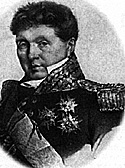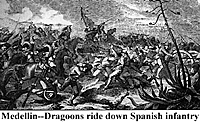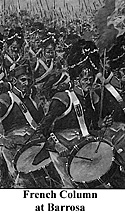Born on December 7, 1764 at Lamarche in the Vosges, you might not expect the son of the local bailiff to be blessed with a great deal of personality, and this should perhaps have been the case, particularly as Victor's father intended that his son follow on in the family business. Nevertheless, the young Claude was a sunny, outgoing sort, to whom people seemed to easily warm. Clearly no material for a bailiff.
Instead in 1781, aged 17, Victor joined the Grenoble Artillery Regiment as a drummer boy, where his easy personality soon earned him the nickname of Le Beau Soleil. Ten years later he left the army, becoming a grocer in Valence. Like so many of the others though, he had been bitten by that bug which only appears to effect members of the male gender.
Civilian life went sour after a mere six months, and the chubby faced gunner joined the National Guard, at the rank of Sergeant of Grenadiers. By the time he was posted to the Siege of Toulon, Victor was a lieutenant-colonel of Volunteers, and after showing cool bravery under fire during an abortive assault, he was made up to colonel.
It was here that Victor had his second stroke of luck (assuming that being lowborn during the French Revolution was the first). A certain Captain Bonaparte in the artillery arrived, and the two met. It seems Bonaparte was suitably impressed with Victor, and apparently the feeling was mutual. Before long they were touring the battle lines together, discussing tactics, and when the Corsican finalised his plans for the storming of the fort of Le Petit Gibraltar, Victor was given command of one of the assault columns. The attack succeeded, and Victor, despite being badly wounded, led his men forward into the breach.
The wound was perhaps his greatest stroke of luck thus far. Bonaparte had also been wounded during the assault, and the two then shared a common promotion to General de Brigade.
Victor was subsequently posted to the Army of the East Pyrenees, whilst Bonaparte went on at his usual rapid pace to command the famous Army of Italy, which Victor had the extreme good fortune to join prior to the campaign of 1796. With a few gallant exceptions it was the Army of Italy that spawned the future marshalate, and without doubt this was a huge piece of good luck for Victor.
Good Fellow that he was (and I mean Nice Chap, not Mafioso), Victor deserved this break more than most of those about whom we have read before, although by joining Massena's Division a few opportunities for pocket-lining were on the horizon. The 57th Demi-Brigade soon earned the nickname "Terrible 57th", performing admirably wherever it took the field, as did Victor at their head. He fought at Borghetto, Lonato, Dego and Roveredo, before being wounded again at San Giorgio.
Returning to command in 1797, he led his brigade at Rivoli and La Favorita, being promoted to General de Division by Bonaparte following his occupation of Ancona. Following a transfer to Kléber in Germany, where he stayed until mid-1798, Victor returned to Bonaparte, staying with him throughout the great campaign of 1800. He was wounded at the Trebbia before covering himself in glory at Montebello and Marengo, where he commanded the left of the army during the worst of that great battle, receiving a Sabre of Honour.
What is then odd is that Victor suddenly went backwards. Posted to diplomatic work in Holland in 1800, a year later the First Consul selected him as Captain-General of Louisiana, not what you might call a job with career prospects. Victor never actually got to America, remaining in Holland. Considering his previous performance, it might have been expected that when the newly crowned Emperor declared his intention to activate the mashalate, Victor might have become a beneficiary. However, he was conspicuously overlooked.
In 1805 whilst everybody who was anybody was chasing the Austrians all over central Europe, Victor was on diplomatic duty in Denmark, but he was recalled for the 1806 campaign against Prussia, fighting as Lannes' chief of staff at Saalfeld and Jena, and later in the year was at Pultusk. He impressed Napoleon enough to be rewarded with command of X Corps for the start of 1807, but within weeks had the misfortune to be captured by Prussian partisans near Stettin.
His incarceration did not last long. Quickly exchanged, Napoleon gave him I Corps which he led at Friedland so capably that on July 13, a month later, he was awarded his baton, ranked nineteenth on the list. Appointed Governor of Prussia, with a few francs in his pocket, things looked to be going well.
Then the Emperor sent him to Spain.
Spain was another matter. The marshals operated under difficult conditions. The Emperor ordered impossible concentrations, not allowing for the peculiar conditions inherent to fighting in the Peninsula. In the spring of 1809 he overcame Spanish forces under Blake at Espinosa and then beat that military titan Cuesta at Medellin. Sadly, this may have looked good on paper, but turning over the Dons was no warm up for dealing with Wellesley's redcoats. Serving under Jourdan, he performed boldly in the failed night attack prior to Talavera, but on the day his aggressive advice went unheeded and we all know what happened next. For the benefit of anybody witty enough to call me Barstool, We Won.
Given independent command in Southern Spain, Victor might be forgiven if he thought that he had escaped the dreaded Iron Duke, facing instead 'only' General Graham. If he did, then he was wrong, and another pasting at Barossa ended his Peninsular career in a woefully familiar manner. What's worse, it was at Barossa that the first French eagle lost to the British was taken, if one discounts Sharpe's performance. By the way, if anybody else comes up to me at a re-enactment event stating 'did you know that Sharpe was one of only three Englishmen given a state funeral?' I shall scream. But I ramble.
Recalled to France in February of 1812, Victor was soon forgiven, particularly as his Spanish experience was hardly worth mentioning alongside some of the ruined reputations, and he was given IX Corps for the Russian campaign. The argument that this is hardly good fortune is difficult to counter. Better for him if he had stayed in disgrace a little longer. IX Corps was not part of the spearhead formation, and thus Victor missed Borodino, but if he thought he'd missed the worst of it, he was of course mistaken.
When the retreat began, Victor was sent to Smolensk where by dint of a few harsh words and some firm behaviour he reorganised a rapidly deteriorating supply line. However, by the time the Grand Army got back to Smolensk it was only a Grand Rabble, and Victor was left with one of the few battle-capable formations.
Accordingly, Victor was shepherded as carefully as possible, and Napoleon needed him, because at the Berezina things got about as bad as it can humanly get. With engineers literally freezing to death whilst building pontoons, Victor's 12,000 men took on 30,000 Russians to buy time, culminating in the action at Studienka, where he exhibited superb personal bravery on a par with Ney. After nearly a week of harassment and battle, Victor's battered corps finally crossed the pontoons one desolate night, the last formed body to do so.
'Shouldn't have given me such a pooey title' might have been my witty riposte, but Victor was too hurt. He begged to be reinstated, offering to serve as a grenadier private rather than be disgraced, and this was perhaps the right approach in hindsight, as the Emperor relented and gave him a command in the Imperial Guard, with whom he was badly wounded at Craonne, his last battle.
Following the Emperor's return from exile in 1815, Victor was one of those who remained loyal to the Bourbons, and despite the fact that Napoleon had his name struck from the list of marshals, he was understanding enough in this case to award Victor a retirement pension, which he took with him into exile with King Louis. As a matter of personal note, I find it hard to forgive any marshal who did not rally round the Short Fat One when he called. I, a proud Englishman am under his spell enough today to know that I would have followed him to Butlins, so Victor gets a black mark at this point.
It is interesting to note that a number of the men who stayed 'faithful' to the 'Fat Bourbon' only attained their positions through the whims of fate caused by the republican revolution. Victor was one of these, and Louis became most impressed with his show of loyalty.
Actually I lied to you at the start of this article. I absolutely hate and loathe Victor. Why? Because of what he did next. I just thought it would make a change if you thought that I actually liked him. Victor proceeded to display his contemptible loyalty to a contemptible monarch by hunting and persecuting his old comrades. He got himself chairmanship of a committee set up to investigate Veterans' Activities. It has an ominous ring to it, does it not?
I am without polite words to describe the contempt that I feel for a man who voted for the death penalty in Ney's trial, and apparently even after this rank committee was wound up he continued in such vein. In 1822, informed that a captain had not voted for a Royalist candidate, Victor had him kicked out of the army without a pension. So much for the man who got one from Napoleon despite deserting him.
Victor's reward for such treachery were a succession of plum postings, including Major General of the Royal Guard and Minister of War between 1821 and 1823. Following the Revolution of 1830 he retired from public life, and when the Emperor's ashes were brought home to Les Invalides in 1840, three of the seven surviving members of the Imperial Marshalate refused to attend and pay their respects. It will not surprise you that Victor was one of these.
So how does one sum up Victor. Certainly not one of the best marshals. He did well enough at times, and showed great bravery on occasion, but by-and-large that was whilst the going was good, excepting the Berezina, of course. The true mark is how he behaved when things got tricky. He was most definitely shaky during 1814 and I have already made my feelings quite clear about what happened after Waterloo. His apparently cheerful nature is also at contrast with his later activities. Perhaps he was just a happy blackguard. Who knows? He was painfully ambitious, like so many of his colleagues, but he seems to have coupled this with a bad case of envy and personal ingratitude. He absolutely hated Ney and Soult, and there are few amongst the other marshals who had time for him. Like so many of them he was only willing to be commanded directly by Napoleon. He resented his novelty ducal title, which bore no glory whatsoever.
During the Emperor's second and final exile, he is recorded only once actually mentioning Victor, whence he commented: "Victor was better than one might suppose."
Hmmm.....
 There aren't many of Napoleon's group off ill-assorted marshals of whom it could be said, 'he was a good egg.' However, in the case of Victor, we find for once a thoroughly likeable fellow.
There aren't many of Napoleon's group off ill-assorted marshals of whom it could be said, 'he was a good egg.' However, in the case of Victor, we find for once a thoroughly likeable fellow.
The 'Lucky' Drummer Boy
The Army of Italy
Prussian Prisoner
Spanish Adventures
 As a sweetener Victor found himself elevated to the nobility. He had cherished notions of becoming Duc de Marengo, but his good nature was tested to the ultimate on the whim of the Princess Pauline Bonaparte, who, thinking that his bowed legs looked like half-moons in white stockings, played a cruel pun by suggesting to her brother that Victor be made Duc de Bellune, meaning 'beautiful moon.' It appears that the only person who thought this to be other than terribly witty was the new duke himself. Still, he bore it gracefully.
As a sweetener Victor found himself elevated to the nobility. He had cherished notions of becoming Duc de Marengo, but his good nature was tested to the ultimate on the whim of the Princess Pauline Bonaparte, who, thinking that his bowed legs looked like half-moons in white stockings, played a cruel pun by suggesting to her brother that Victor be made Duc de Bellune, meaning 'beautiful moon.' It appears that the only person who thought this to be other than terribly witty was the new duke himself. Still, he bore it gracefully.
On to Russia
 There was little respite, as Napoleon struggled to rebuild his army and the Allies threatened on every side. Victor subsequently saw action at Dresden and Leipzig, and retreated with his master onto home soil for 1814. This is about when things began to go a bit pear-shaped for the amiable marshal. He began showing symptoms of poor morale, even allegedly defeatism, and although he performed well enough at Brienne and La Rothiere, he was dilatory before Montereau and on being relieved of his command was mortally stung by these words from his Emperor: "The Duke of Belluno's conduct has been dreadful."
There was little respite, as Napoleon struggled to rebuild his army and the Allies threatened on every side. Victor subsequently saw action at Dresden and Leipzig, and retreated with his master onto home soil for 1814. This is about when things began to go a bit pear-shaped for the amiable marshal. He began showing symptoms of poor morale, even allegedly defeatism, and although he performed well enough at Brienne and La Rothiere, he was dilatory before Montereau and on being relieved of his command was mortally stung by these words from his Emperor: "The Duke of Belluno's conduct has been dreadful."
Loyal Bourbon
Disloyal to the End
Back to Table of Contents -- First Empire #35
Back to First Empire List of Issues
Back to MagWeb Master Magazine List
© Copyright 1997 by First Empire.
This article appears in MagWeb (Magazine Web) on the Internet World Wide Web.
Other military history articles and gaming articles are available at http://www.magweb.com